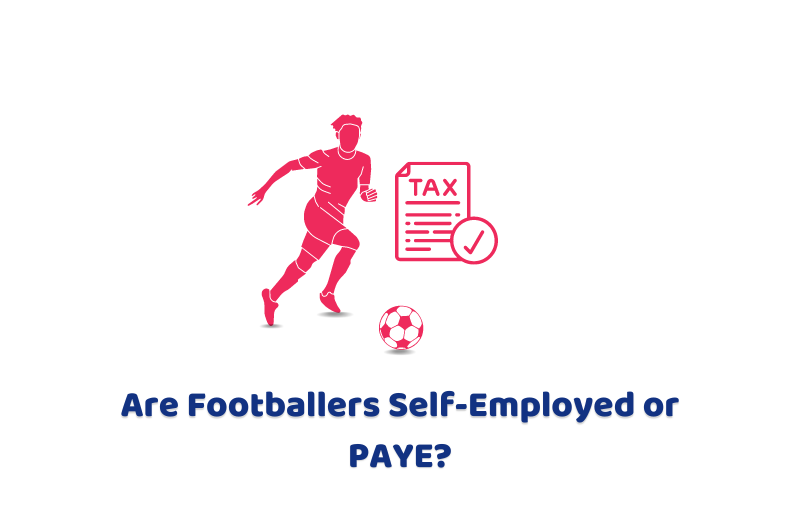For individuals who are interested in sports for the love of football, that is the only game that seems to be worthy of their time. Such fans tend to discuss the games and footballers nonstop, however, if anyone is associated with the business and tax implications will definitely wonder whether are footballers self-employed, or PAYE. How much tax they might pay if at all and what is the amount that they are making within the period of a tax year? These are the frequently asked questions of people with tax awareness and how HMRC tend to deal with the tax implications on footballers as per their earnings.
In case you are also curious about the income and tax implications of footballers, you are on the right page as we have got you covered with the discussion based on relevant frequently asked questions. Further, this article involves a discussion on what it is to be PAYE, whether footballers are self-employed or PAYE, how is it possible for HMRC to keep a track of earnings, and what are the tax implications of the footballers.
AccountingFirms can assist you in managing your tax liabilities with the maximum tax relief possible. Let’s talk to one of our professionals and a dedicated accountant or tax advisor.
What is the Meaning of Being PAYE?
The word PAYE refers to ‘pay as you earn, as it is used as an abbreviation. Many of us already know this as a piece of general information. It is depicted by the name as well that this is a kind of system that is related to tax implications and relevant responsibilities. The main tax implications in the UK are easily dealt with through the system of PAYE as HMRC requires the earning information of the employees. So that the tax implications are done according to the earnings accurately. The major two types of tax implications in the UK is a national insurance and income tax. Several people enquire whether income tax and national insurance are a must-have or optional. Well, generally there is no way out to escape from these two.
However, this depends a lot on what is your employment status which will decide your tax charges and relevant responsibilities. People who are working for a company or business and receive the salary slip each month, are associated with the PAYE system and the tax deductions are already made with the help of this system. In this case, a unique tax code is also given to you by your employer and generally, it is found on your salary slip as well. Your tax charges and bills will depend on the amount of income you are making in a month.
Are Footballers Self-Employed or PAYE?
When it comes to footballers, people often enquire about their employment status. Whether the footballers are self-employed or PAYE. If a footballer is hired through a club, there are chances that his employment status is PAYE. Just like other companies and their hired employees, there will be a written contract between the club and the footballers as well.
Most of you might already know by now that the tax deductions are made before you receive your monthly salary through the PAYE system, this happens with footballers if they are associated with the PAYE system. The reduction details are also a part of your salary slip. Those who intend foul play, in this case, must realise that HMRC offers a very slim margin in the tax affairs and there can not be any escape if you are liable to pay tax.
How Does HMRC Keep a Track of How Much I Earn?
Whether you are PAYE or self-employed as a footballer, HMRC is always well aware of the income details that you are making within the period of a month. This is also important for HMRC to be well aware of the income details because this is required to ensure that accurate tax bills are charged to every individual. It has been observed that footballers are the individuals who come under the category of high earners. The amount of money that they are able to make within the period of a tax year is sometimes more than the limit of £150,000.
This is because footballers are falling under the higher tax brackets mostly. Such employees will have to pay a 45 per cent tax rate because of being high earners. This is the rate of income tax for high earnings. Moreover, before you decide to pay tax, consider the following to be part of your awareness:
- You will be charged tax with a 0% rate if your income is £12,570 or lesser than this.
- The basic tax rate of 20% will be charged if your income is between £12,571 – £50,270.
- The higher tax rate of 40% will be charged if you are earning between £50,271 – £150,000.
- You will be charged with an additional tax rate of 45% if your income is £150,000 +.
The Bottom Line
Now that we have gathered a fair amount of information about whether are footballers self-employed, we can bring the discussion towards wrapping up. We can say that a footballer can be self-employed or PAYE, however, they can not escape from the tax implications as there are no exemptions for them even if they are high earners. The higher the income the higher the tax rate will be. We hope these few minutes of reading will be helpful to develop a better understanding of tax implications for high earners like footballers.
We are committed to delivering exceptional accounting services to our valuable clients in the UK to ensure they get the most professional solution to accounting problems.
Disclaimer: All the information provided in this article on ‘are footballers self-employed’, including all the texts and graphics, is general in nature. It does not intend to disregard any of the professional advice.

